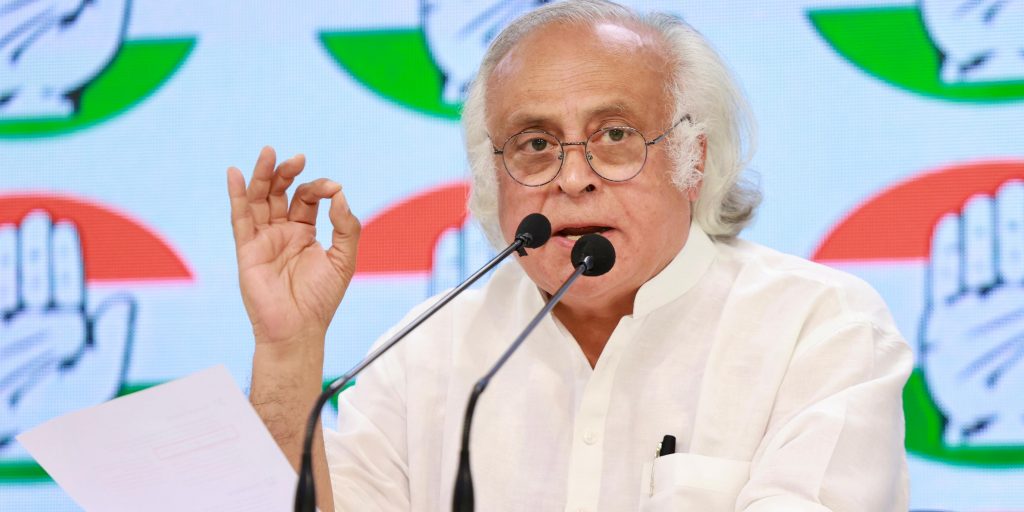 "Self-Serving Petty Politics": Jairam Ramesh Blasts PM Modi Government On Slashing Karnataka's Special Grants
"Self-Serving Petty Politics": Jairam Ramesh Blasts PM Modi Government On Slashing Karnataka's Special GrantsAccusing the Prime Minister Narendra Modi-led government, Congress leader Jairam Ramesh took to X (formerly known as Twitter) to highlight that the central government had rejected the Finance Commission’s recommendations for special grants for the state of Karnataka, withholding almost Rs 12,000 crores.
The Congress MP detailed that the Finance Commission had recommended Rs 5,495 crores in special grants, and Rs 6,000 crores for special projects for Karnataka. He stated that despite the state contributing around Rs 4.3 lakh crore annually in taxes, Finance Minister Nirmala Sitharaman had rejected the Commission’s recommendations, withholding around Rs 12,000 crores from the state.
Calling it a “political vendetta”, the Congress MP accused the central government and its “remote-controlled ministers” of violating the spirit of federalism and circumventing the recommendations suggested by Constitutional bodies. He stated that the state and its citizens were being punished for exercising their “democratic right to elect a Congress government.”
He also emphasized that when Prime Minister Narendra Modi served as a Chief Minister of Gujarat, he would often complain about the problems faced by the state including the share of funds allocated to Gujarat. However, the Congress general secretary claimed that in the same vein, the prime minister “constantly tries to throttle the finances of India’s states.”
The Modi government and its remote-controlled ministers will cross every line to violate the spirit of federalism, to sidestep the recommendations of Constitutional bodies, and to unleash their political vendettas. This time, the price is being paid by the people of Karnataka,… https://t.co/zJ1sRcYEDI
— Jairam Ramesh (@Jairam_Ramesh) March 25, 2024
Karnataka Chief Minister Siddaramaiah had tweeted that the interim report of the 15th Finance Commission for 2020-21 had sanctioned Rs 6,764 crores for three states to ensure that no state received lower shares than the previous year. Karnataka was allotted Rs 5,495 cores, Telangana Rs 723 crores and Mizoram Rs 546 crores. The report had also recommended Rs 3,000 crores for reviving water bodies in Karnataka and Rs 3,000 crores for the Peripheral Ring Road to decongest Bengaluru. The grants were made after the sum of tax devolution and revenue deficit grant for the three states projected a decline from 2019-20 to 2020-21.
However, the Sitharaman-led Ministry of Finance rejected the two recommendations.
Tagging the Finance Minister, Siddaramaiah also stated, “Since you don’t seem to have any faith in or commitment to the federal polity enshrined in our Constitution, you don’t seem to understand the concept of rightful share of the states.”
“Kannadigas demand their share. They are not begging,” he added.
One expects the country’s Finance Minister to speak the truth. Unfortunately, she has been consistently denying the written word.
The interim report of the 15 FC for 2020-21 sanctioned Rs 6764 crores for three states, viz Karnataka (Rs 5495 crores), Telangana (Rs 723 crores) &… pic.twitter.com/8kFhl70oo2
— Siddaramaiah (@siddaramaiah) March 24, 2024
Around January, the CEO of the government think tank NITI Aayog, BVR Subrahmanyam, had revealed that PM Modi had made attempts to cut the finances allotted to particular states through backdoor negotiations. The Prime Minister had made attempts through off-record negotiations with the Commission’s chairman YV Reddy to slash the amounts suggested in the recommendations. Reddy had earlier served as the governor of the Reserve Bank of India (RBI).
While the Finance Commission refused to oblige, the Modi government was forced to redo its budget planning within 48 hours and slash funding for welfare programs instead. The welfare programs related to central Ministry of Women and Child Development ended up getting axed, as stated by Subrahmanyam.
In Parliament, PM Modi then falsely claimed that he had welcomed the Commission’s suggestions on the tax portions that were to be allocated to the states, hiding his attempts to reduce the share of states’ revenue, reports Al Jazeera.
This is an extraordinary revelation by a top Modi government official who is currently no less than the CEO of the NITI Aayog.
The official has revealed that PM Modi himself made a dastardly unconstitutional attempt to intimidate the 14th Finance Commission into letting him… pic.twitter.com/HYPNTT8PAC
— Jairam Ramesh (@Jairam_Ramesh) January 18, 2024
“There’s a dispute among Finance Commission members. We could have taken advantage of that. We didn’t. But it is our commitment that states should be enriched, should be strengthened. We gave them 42 percent devolution… Some states would not have treasuries big enough to keep all this money,” PM Modi had said in Parliament on February 27, 2015, as quoted by Al Jazeera.
According to the report, the government has the power to reject the Commission’s report but it cannot ask for alterations. If the Commission does give in to the government’s suggestions, then it would result in a breach of constitutional propriety, allowing the government to blame the constitutional body of reducing the states’ income.
